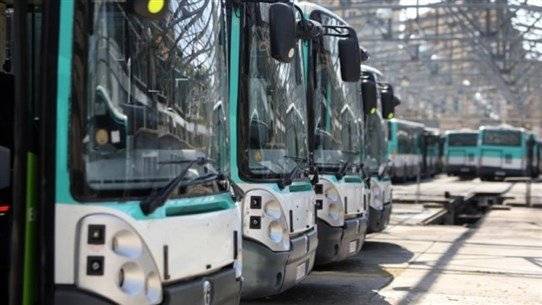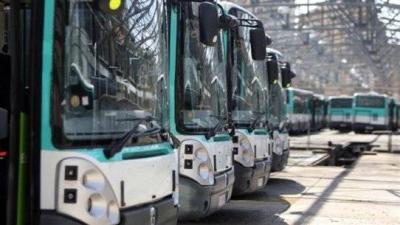Four months after their arrival in Lebanon, the French buses remain out of service. The reason is bureaucratic routine and the closure in the public sector, which has delayed their registration until now. However, a resolution may emerge next week that will expedite the operation of the buses on the roads of Greater Beirut, with a fare that will not exceed half of the officially determined transportation allowance of approximately 95,000 LBP per day.
On May 23, Lebanon received 50 buses as a French donation, which were expected to, along with 45 buses that were rehabilitated by the Public Transport and Rail Authority, mark a step towards reviving public transportation amid a crisis that has led to wage erosion and increased commuting costs from home to work. However, this step has been delayed, raising doubts about the Ministry of Public Works, especially since no one has been encouraged to participate in the bidding for the operation of the buses.
This prompted Minister of Public Works Ali Hamieh to hold a press conference at the Public Transport Authority, with the donated buses behind him. He noted that within a week of the buses' arrival in Lebanon, the Ministry was surprised after sending formal letters to relevant administrations, such as the Traffic Management and Customs, that some administrations wanted a legal clarification regarding who had received the buses: the Ministry of Public Works or the Rail and Transport Authority? And whether they are subject to VAT and customs duties.
This debate persisted for four months, accompanied by a public sector strike lasting about two months, until a resolution was reached two days ago to register the buses and exempt them from taxes. However, this is not the only problem preventing the buses from being put into service. The next steps are not easy either. The ministry had previously launched a tender in August to contract a private company to provide drivers for the buses, but no company submitted a bid, so it will be reissued next week. In the meantime, drivers from the Rail Authority will take on the responsibility of driving the buses, despite their low salaries ranging from 800,000 LBP to 2 million LBP.
There is also the issue of bus routes, fare, as well as operational and maintenance costs. According to Minister Ali Hamieh, the buses will operate within Greater Beirut on the most crowded routes with a high passenger ratio. The fare for using public transport will be set by the ministry, designed to equal half of the official transportation allowance currently set at 95,000 LBP for each workday. "The goal is to enable commuting to and from work within a limit that does not exceed what is earned from transportation allowances," says Hamieh. As for acquiring the necessary diesel to operate the buses, Hamieh will request the Ministry of Finance to provide credits for this matter, although he is aware that continued fuel price increases may hinder the buses' operation. Additionally, there is a need to adjust the wages of drivers in the Public Transport Authority and Rail, and Hamieh will request "to improve their conditions and give them what was provided to public sector employees in terms of social aid and productivity compensation."




